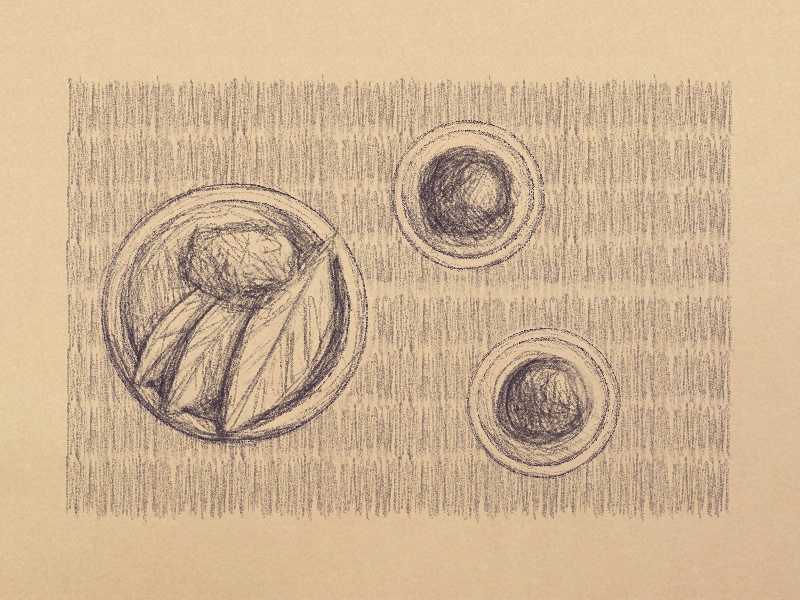By: Arlette Martinez
The Food Matters and Materialities Conference panel titled “Intersections of Food and Memory in Asia: Narratives of Culture, Nationalism, Gender and Conflict” showcased the work of three researchers who explore the connections between memory, gender, and identity through culinary practices in China, India, Nepal, and Sri Lanka. Geetha Sukumaran, Sanchia Desouza, and Ian Turner‘s discussion focused on non-Western feminist narratives in written materials and how these narratives offer a glimpse into different Asian identities and how people express their identity through food.

Credits: Illustration by Kit Chokly.
The three panelists suggested that we can find personal and national narratives and valuable insights in archives, poems, social media posts, or even notebooks. Their findings demonstrate that Asian experiences are varied and significantly different from Western experiences. For example, Sukumaran explained that Western feminism, although well-intentioned, often forgets the unique experiences of women in non-Western parts of the world. By engaging with non-Western narratives, even Western scholars can develop a more nuanced and more inclusive understanding of people’s diverse lives experiencing overlapping, simultaneous forms of oppression, such as poverty, caste systems, racism, and sexism. Engaging with non-Western realities can also aid scholars in gaining a deeper understanding of the depths and relationships of inequalities in any given context. The importance of food is a common subject in such narratives.
According to Sukumaran, “food itself is both cultural work and cultural identity. The work that stems from that identity is entirely different and specific to each culture”. She emphasized that the struggles women face, vary significantly across regions, but they can be better understood through narratives about “culinary scapes”.
As the three panelists explain, culinary scapes are gendered sites of cultural production where food plays a vital role in consolidating ethnic, national, and personal identity. Similar to landscapes, elements of these ‘scapes’, such as kitchens and homes, are a partial view of wider cultural and historical processes. The three panelists’ presentations demonstrate how culinary scapes in Asia are quite diverse and complex. Sukumaran added that “when we think of conflict zones, food is linked to scarcity and memory, which influences the people involved, and the writings and narratives that have come out of it.”
Moreover, Sukumaran argues that the writings by former Sri Lankan women combatants provide exciting insights into food, memory, and conflict. These memoirs create a space to remember a messy, contentious, and violent past through food. Sri Lanka’s resistance movement had both female and male combatants. Still, some women did not partake in the fighting but did food work to support those fighting. “The care work itself is also a part of the resistance,” explained Sukumaran.
Desouza notes that her study of Dalit men’s writings reflects not only food in conflict and memory but also class and gender struggles. She also looked at women’s writing but found “an evident inner struggle in their narrative because food is so closely related to women’s work.” Desouza added that Dalit (‘lower’ caste) men also wrote about food scarcity, hunger and deprivation while criticizing the ‘upper’ castes and political elites who “yearn for food” made and served by lower caste domestic workers, typically women.
Turner explores how the Newar community in Nepal’s Kathmandu Valley has drawn on Indigenous traditions of Buddhism and Hinduism throughout recent decades of modernisation, liberalisation, and crisis. Food is essential for the Newar not only in religious rituals but also for social cohesion. Turner looked at the writings of a recent contributor to Nepalese Newar cultural discourse and social commentator, Motilaxmi Shakya, and he argued that the mere publication of Shakya’s work was a feminist act because it was “written from the perspective of a woman in a society where so much is implicitly male.” Through her book, “we get a sense of what a woman is: someone who has undergone certain experiences marked by gender. And that experience extends through her mother, grandmother, great grandmother, etc. For Shakya, food is about sociality and of thinking about how we should get along with one another.”
Turner found that Motilaxmi Shakya’s writing often defended traditional social hierarchies and gender roles that led to younger women being oppressed by their husbands’ families. However, he argues this contradiction is not in her writing, but instead, reflects her age, upper caste, and anxieties surrounding cultural change. Turner argues that through her writing, Shakya provides a way to understand her within the cultural context in which she writes, adding that it is essential not to see Shakya as a disembodied voice of the contemporary Buddhist woman.
In combination, the panelists’ research demonstrates that written works can reflect aspects of non-Western lived experiences and resistance, which are often omitted in Western feminist scholarship. For example, Dalit autobiographies, Sri Lankan women combatant’s memoirs, and Motilaxmi Shakya’s work are socio-cultural representations describing historical and political situations in local scenarios, alongside the author’s first-hand impressions. These narratives are also compelling accounts of people’s relationships with food, inner struggle, and perseverance.
Thank you, Geetha Sukumaran, and joined by Sanchia Desouza and Ian Turner for a fascinating and enlightening conversation.